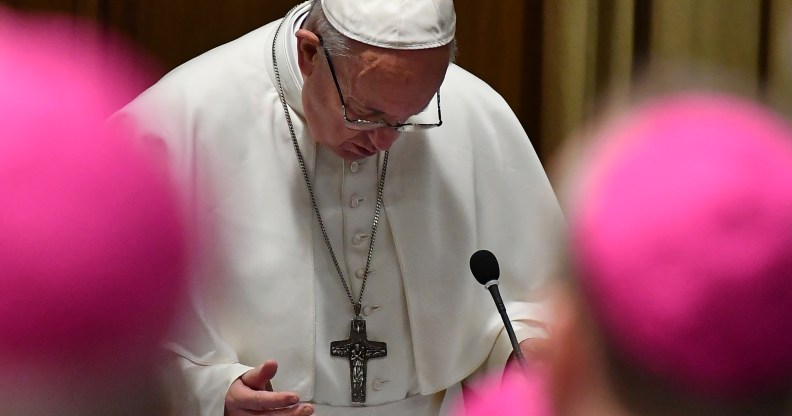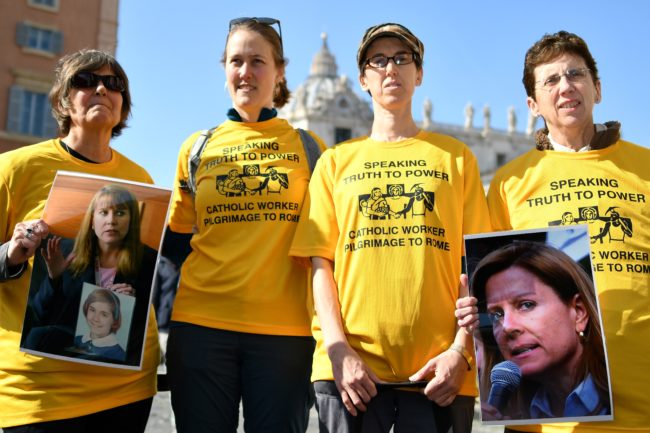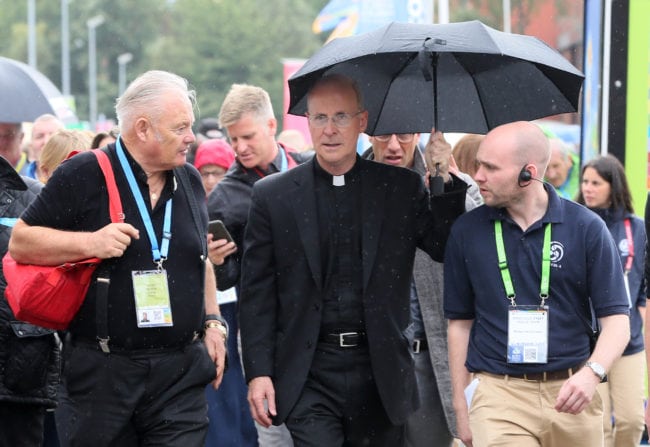Pope Francis opens Vatican sexual abuse summit amid concerns of gay blame

Pope Francis has set aside three and a half days to convince Catholic bishops to tackle paedophilia in a bid to contain a scandal which hit an already beleaguered Church again in 2018, from Chile to Germany and the United States. (Vincenzo Pinto/AFP/Getty)
Pope Francis opened a Vatican summit to address the scourge of clerical sexual abuse of children on Thursday (February 21), one of several scandals that have recently plagued the Catholic Church.
As The New York Times recently reported, the rape of nuns, the handling of priests who father children and the secrecy surrounding gay priests are other issues that are eroding trust in the millennial institution.
French journalist and author Frédéric Martel, whose latest book on homosexuality in the Holy See estimates that 8 in 10 Vatican priests are secretly gay, spoke at an event in Rome ahead of the summit, blaming clerical sexual abuse on the “culture of secrecy” which prevents priests from reporting those who abuse minors for fear of being outed as gay.

Members of Ending Clergy Abuse, a global organisation of prominent survivors and activists, are in Rome this week for the summit on clerical sexual abuse on minors organsied by Pope Francis. (Alberto Pizzoli/AFP/Getty)
Also ahead of the start of the summit, cardinals Raymond Burke and Walter Brandmüller wrote an open letter to the National Catholic Register in which they urged bishops attending the summit to condemn “the plague of the homosexual agenda.”
Addressing the bishops that flew to Vatican City from across the world for the four-day meeting on Thursday, Pope Francis demanded “concrete and effective” measures to tackle the problem, rather than “simple and predictable condemnations.”
But Father James Martin, a pro-LGBT American Jesuit priest, is among those concerned that the summit will provide a platform for those conservative forces in the Catholic Church who, like Burke and Brandmüller, seek to promote the baseless claim that child sex abuse is due to homosexuality.
PinkNews asked Father Martin what he believes to be the way forward for Pope Francis and the Catholic Church.
What are your hopes for the summit on clerical sexual abuse?
My hope for this meeting is twofold, but I suspect only the first is likely to happen.
First, that bishops from countries where the church often denies that there is any problem—as in “That only happens in the US and in Europe”—or that believe it’s a “media creation,” will hear from victims first hand and will grasp that this is a worldwide problem that demands action. That is apparently the main purpose of this meeting: it’s meant to school the bishops.
Second, I hope that the meeting produces concrete results: as one example, clearer rules about how to deal with bishops who have covered up these crimes.
Are you concerned about the summit reinforcing the baseless claim that the sexual abuse in the church is due to homosexuality?
Yes, I am. As we know, simply being gay—or, more broadly, LGBT—does not mean that one is an abuser. The majority of abuse cases still happens in families and no one says that all married men are somehow abusers. Yet the vast majority of gay priests, who are faithful, hardworking and celibate, and have never abused anyone, are still afraid to come out. Why? One reason is the current poisonous environment.
As a result, the only public model of the gay priest is the abuser. So, inevitably, the stereotype of the gay priest abuser has fixed itself in some people’s mind. And the far right has used this as an excuse to conduct a witch hunt for gay priests, and attack LGBT+ people in general. It’s using the suffering of others to cause even more suffering.
Under Pope Francis, the LGBT+ community has received mixed signals from the Church. Despite some of the pontiff’s statements such as “Who am I to judge,” the Synod on Youth refused so much as using the LGBT acronym to refer to gay people. Why is there still such resistance to evolve the Church’s stance on LGBT+ rights?
You’re right about mixed signals. But we have to remember the positive ones. Pope Francis’s famous “Who am I to judge?” comment—which was an answer to a question about gay priests, by the way—is only one part of that. He’s the first pope even to use the word “gay,” he has gay friends, and he’s written about LGBT+ people compassionately.
And while you’re right that the Synod resisted using the term LGBT, a few months earlier, the Vatican pointedly used that term when it invited me to give a talk at the World Meeting of Families in Dublin in August. The talk was called “Showing Respect and Welcome in our Parishes for LGBT People and their Families.” And the Vatican came up with that title.

Pro-LGBT Jesuit priest James Martin is concerned the summit on clerical sexual abuse may reinforce negative stereotypes about gay priests. (Paul Faith/AFP/Getty)
Resistance, though, comes from many places. Mainly fear. Fear of the LGBT+ person as “other.” Fear that respecting them is somehow against the Gospel—it’s not, of course. Fear of change of any sort. And, most fundamentally, fear of one’s own complicated sexuality.
Part of the ministry I’ve been trying to do, and one reason I wrote my book Building a Bridge, is to break down that fear, which I think will lessen the resistance. But it’s happening. Remember: as more and more Catholics come out, more and more families are affected. And as more families are affected, more parishes are affected. And in this way the whole church is affected. That trend will only grow stronger.
Does Pope Francis have enough political will, influence and support to make a revolutionary decision to change the clergy as we know it—either making celibacy optional or opening up the clergy to women and/or gay men?
Pope Francis could change some of these things, but not all of them. There is already a commission that he set up to investigate the history of women deacons. Many people think this is a prelude to him opening that ministry up to women—or, more accurately, “restoring” that ministry, since the commission found clear historical evidence that there were women deacons for the first 1,000 years of Christianity.
The Pope has also talked about the possibility of ordaining married men in areas where there are few priests. So he’s open to both of these things. And I think it has less to do with will, influence and support, and more to do with his discerning if it’s the right time for these decisions for the whole church.
Can the Catholic Church survive its scandals without modernising, or at least acknowledging wrongdoing in its handling of clerical abuse?
The church has—in many places and in many ways—acknowledged its wrongdoing. That has come in terms of direct apologies to victims and survivors; public apologies by popes, cardinals and bishops; and in many other ways.
The US church addressed this directly in 2002, when it put in place its “zero tolerance” rules. This current meeting in the Vatican is also a form of acknowledging crimes and sins.
As for modernising, Pope Francis is trying to move the church closer to the vision of the Second Vatican Council, which meant to orient the church towards the modern world.
But we believe the church will survive—It has done so for 2,000 years, even with some of the worst sins, crimes and corruption imaginable. The survival of the church doesn’t depend on the holiness of its priests. If that were the case, we would have closed up shop in AD 33.

